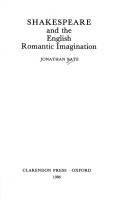Clarendon Paperbacks
2 total works
Although it is well known that the Romantics were obsessed with Shakespeare, little attention has been paid to the ways in which he influenced their creative practices and their theories of the imagination. This new work finally presents the fascinating picture of how the Romantics read Shakespeare and responded to the implications of his work for their own poetry. The book provides the first full critical discussion of Shakespeare and Wordsworth, explores the influence of the plays on the poetry of Blake and Coleridge, and offers a fresh account of Shakespeare's powerful presence in the letters and poems of Keats and Byron, and in Shelley's dramas. Taking issue with prevalent deconstructionist theories and Harold Bloom's ideas on "the anxiety of influence," Bate instead carefully illustrates the ways in which initial attempts at blind imitation were transformed into graceful poetic echo and allusion.
This volume is an account of the relationship between Shakespeare and his favourite poet, Ovid. Examining the full range of Shakespeare's writings, Jonathan Bate shows how deeply creative the influence of Ovid on Shakespeare was, especially in the latter's representation of myth, metamorphosis and sexuality. From the raped Lavinia's turning of the pages of the "Metamorphoses" in "Titus Andronicus" and the staging of "Pyramus and Thisbe" in "A Midsummer Night's Dream", to the reanimation of Hermione's statue in "The Winter's Tale" and Prospero's renunciation of his magic in "The Tempest". Ovid's presence is identified not only in the narrative poems and pastoral comedies, but in the sonnets and mature tragedies as well. The "Heroides" are shown to have been vital to Shakespeare's female characters, but it is the "Metamorphoses" which animate Professor Bate's book, just as they animated the whole of Shakepeare's career. The author has also written "Shakespeare and the English Romantic Imagination" and "Shakespearian Constitutions: Politics, Theatre, Criticism 1730-1830".

